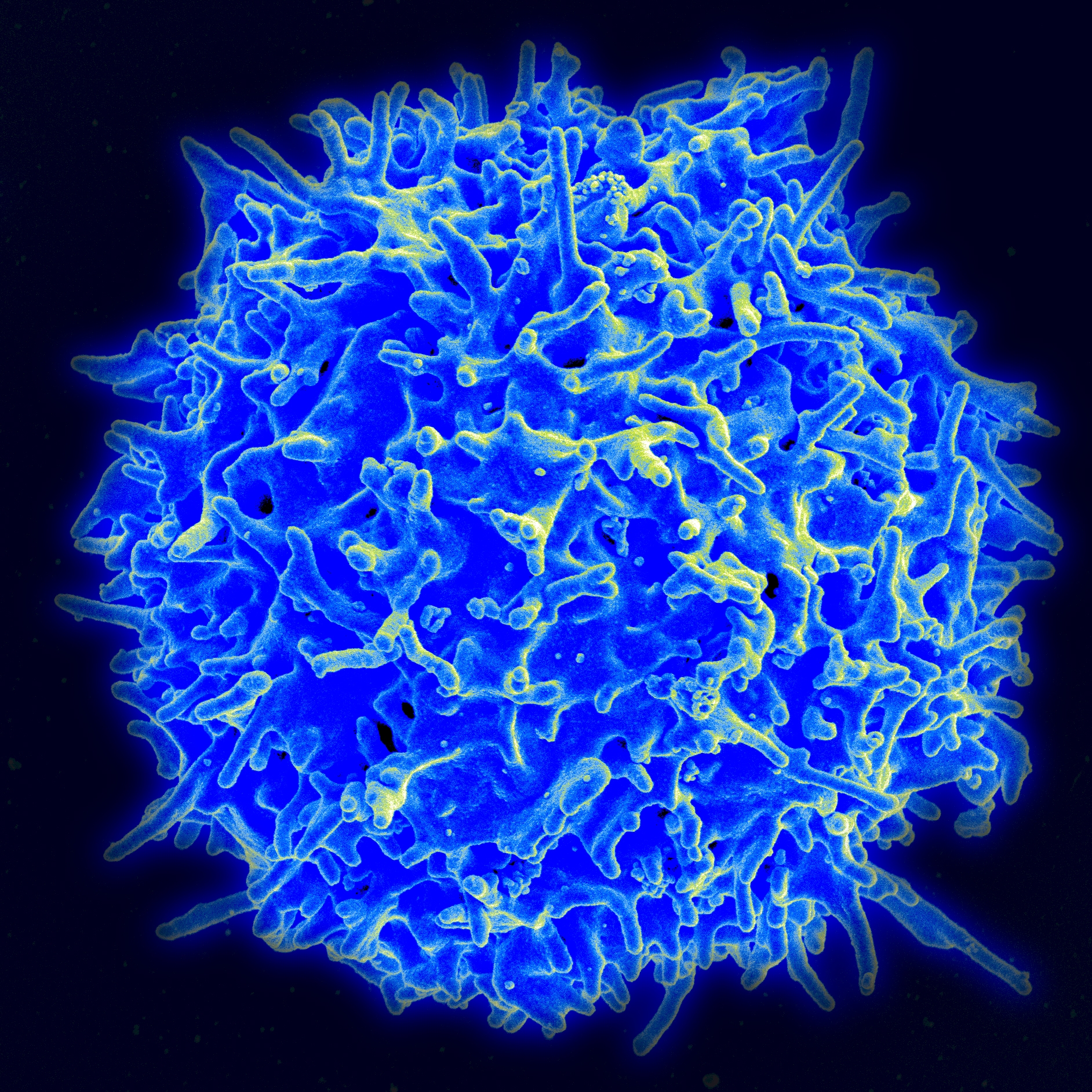Adult T-cell leukemia/lymphoma
| Adult T-cell leukemia/lymphoma | |
|---|---|

| |
| Synonyms | N/A |
| Pronounce | N/A |
| Specialty | N/A |
| Symptoms | Lymphadenopathy, hepatosplenomegaly, skin lesions, hypercalcemia |
| Complications | Infection, organ failure |
| Onset | Typically in adulthood |
| Duration | Chronic |
| Types | Acute, Lymphomatous, Chronic, Smoldering |
| Causes | Human T-lymphotropic virus 1 (HTLV-1) |
| Risks | HTLV-1 infection, immunosuppression |
| Diagnosis | Blood test, biopsy, imaging studies |
| Differential diagnosis | Non-Hodgkin lymphoma, chronic lymphocytic leukemia |
| Prevention | N/A |
| Treatment | Chemotherapy, antiviral therapy, stem cell transplant |
| Medication | N/A |
| Prognosis | Variable, often poor |
| Frequency | Rare |
| Deaths | N/A |
A type of cancer affecting T-cells
Adult T-cell leukemia/lymphoma (ATLL) is a rare and aggressive type of cancer that affects the T-cells of the immune system. It is associated with infection by the Human T-lymphotropic virus type 1 (HTLV-1). ATLL is characterized by the proliferation of malignant T-cells and can present in various clinical forms.
Classification[edit]
ATLL is classified into four main clinical subtypes:
- Acute ATLL: This is the most aggressive form, characterized by rapid progression and a high number of circulating malignant T-cells.
- Lymphoma-type ATLL: This form presents primarily with lymphadenopathy and does not have a significant leukemic component.
- Chronic ATLL: This subtype has a slower progression and is often associated with skin lesions and mild lymphadenopathy.
- Smoldering ATLL: This is the least aggressive form, with minimal symptoms and a slow progression.
Pathophysiology[edit]
ATLL is caused by the HTLV-1 infection, which leads to the transformation of T-cells into malignant cells. The virus integrates into the host genome and affects cellular pathways that control cell proliferation and apoptosis. The exact mechanism of transformation is complex and involves multiple genetic and epigenetic changes.
Epidemiology[edit]
ATLL is most prevalent in regions where HTLV-1 is endemic, such as southwestern Japan, the Caribbean, parts of Central Africa, and South America. The disease primarily affects adults, with a higher incidence in individuals over the age of 40.
Clinical Features[edit]
The clinical presentation of ATLL varies depending on the subtype. Common symptoms include:
Diagnosis[edit]
Diagnosis of ATLL involves a combination of clinical evaluation, laboratory tests, and imaging studies. Key diagnostic criteria include:
- Detection of HTLV-1 antibodies in the blood
- Abnormal T-cell morphology in peripheral blood smears
- Immunophenotyping to identify T-cell markers
- Genetic testing for HTLV-1 integration
Treatment[edit]
Treatment options for ATLL depend on the subtype and severity of the disease. Common approaches include:
Prognosis[edit]
The prognosis for ATLL varies by subtype, with acute and lymphoma-type ATLL having a poorer prognosis compared to chronic and smoldering forms. Overall, the disease is associated with a high mortality rate, and long-term survival is limited.
Prevention[edit]
Preventive measures focus on reducing the transmission of HTLV-1, including:
- Screening blood donors for HTLV-1
- Promoting safe sex practices
- Educating at-risk populations
Related pages[edit]
Gallery[edit]
-
A healthy human T-cell
Ad. Transform your life with W8MD's Budget GLP-1 injections from $75


W8MD offers a medical weight loss program to lose weight in Philadelphia. Our physician-supervised medical weight loss provides:
- Weight loss injections in NYC (generic and brand names):
- Zepbound / Mounjaro, Wegovy / Ozempic, Saxenda
- Most insurances accepted or discounted self-pay rates. We will obtain insurance prior authorizations if needed.
- Generic GLP1 weight loss injections from $75 for the starting dose.
- Also offer prescription weight loss medications including Phentermine, Qsymia, Diethylpropion, Contrave etc.
NYC weight loss doctor appointmentsNYC weight loss doctor appointments
Start your NYC weight loss journey today at our NYC medical weight loss and Philadelphia medical weight loss clinics.
- Call 718-946-5500 to lose weight in NYC or for medical weight loss in Philadelphia 215-676-2334.
- Tags:NYC medical weight loss, Philadelphia lose weight Zepbound NYC, Budget GLP1 weight loss injections, Wegovy Philadelphia, Wegovy NYC, Philadelphia medical weight loss, Brookly weight loss and Wegovy NYC
|
WikiMD's Wellness Encyclopedia |
| Let Food Be Thy Medicine Medicine Thy Food - Hippocrates |
Medical Disclaimer: WikiMD is not a substitute for professional medical advice. The information on WikiMD is provided as an information resource only, may be incorrect, outdated or misleading, and is not to be used or relied on for any diagnostic or treatment purposes. Please consult your health care provider before making any healthcare decisions or for guidance about a specific medical condition. WikiMD expressly disclaims responsibility, and shall have no liability, for any damages, loss, injury, or liability whatsoever suffered as a result of your reliance on the information contained in this site. By visiting this site you agree to the foregoing terms and conditions, which may from time to time be changed or supplemented by WikiMD. If you do not agree to the foregoing terms and conditions, you should not enter or use this site. See full disclaimer.
Credits:Most images are courtesy of Wikimedia commons, and templates, categories Wikipedia, licensed under CC BY SA or similar.
Translate this page: - East Asian
中文,
日本,
한국어,
South Asian
हिन्दी,
தமிழ்,
తెలుగు,
Urdu,
ಕನ್ನಡ,
Southeast Asian
Indonesian,
Vietnamese,
Thai,
မြန်မာဘာသာ,
বাংলা
European
español,
Deutsch,
français,
Greek,
português do Brasil,
polski,
română,
русский,
Nederlands,
norsk,
svenska,
suomi,
Italian
Middle Eastern & African
عربى,
Turkish,
Persian,
Hebrew,
Afrikaans,
isiZulu,
Kiswahili,
Other
Bulgarian,
Hungarian,
Czech,
Swedish,
മലയാളം,
मराठी,
ਪੰਜਾਬੀ,
ગુજરાતી,
Portuguese,
Ukrainian
